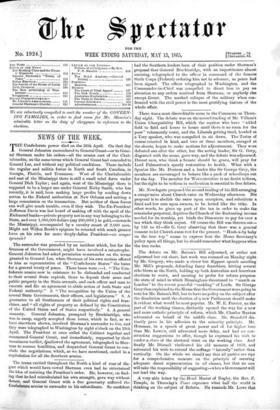The debate on Mr. Baines's Bill adjourned, or rather not
adjourned but cut short, last week was resumed on Monday night by Mr. Gregory, who made a clever but flippant speech assailing Mr. Mill's proposals, defending fancy franchises, hitting several side-blows at the North, holding up both Australian and American elections to scorn, and seeming to prefer for reform purposes the state of mind in which Birmingham threatened to "march on London" to the recent peaceful "cackling" of Leeds. Sir George Grey then explained to the House that the Government were going to vote for Mr. Baines's Bill, but to have no policy on the subject after the dissolution until the election. of a new Parliament should make it evident what would be most popular. Mr. W. E. Forster, on the part of the working classes, distinctly opened the way for a new and more catholic principle of reform, which Mr. Charles Buxton advocated on behalf of the middle class. Mr. Sta.nsfeld dis- tinctly gave in his adhesion to the minority principle. Mr. Horsman, in a speech of great power and of far higher tone than Mr. Lowe's, still advocated mere delay, and had no con- structive suggestions to offer, though he expressed his wish to confer a share of the electoral trust on the working class And finally Mr. Disraeli vindicated his old measure of 1859, and reiterated his wish to extend the suffrage "laterally" rather than vertically. On the whole we should say that all parties are ripe for a comprehensive measure on the principle of securing adequate direct representation to all classes, but that no one will take the responsibility of suggesting—when a Govemmentwill not lead the way.






























